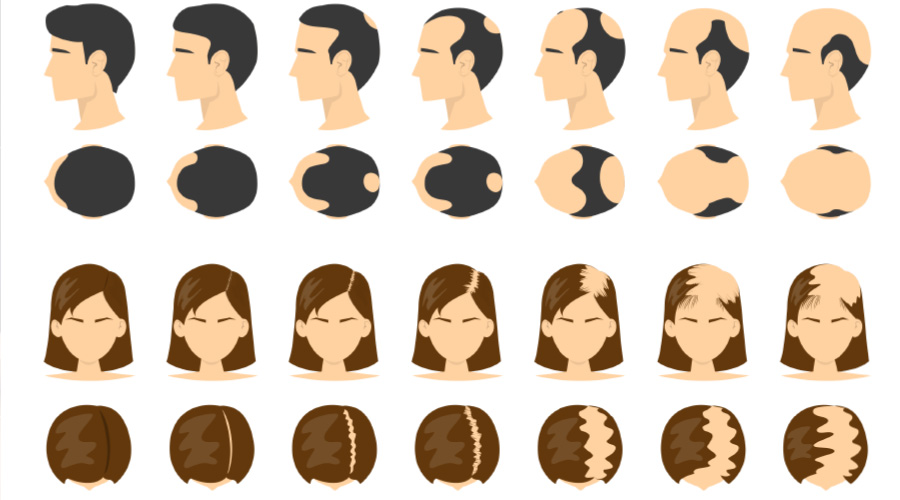Currently, there are various solutions available to address hair loss issues, including oral medications and topical remedies and products. In general, it can be stated that hair transplantation is not the sole method for regaining lost hair. However, it is important to note that, apart from a hair transplant, no remedy can permanently regrow new hair for hair that has already fallen out. These medications and remedies may only strengthen and thicken existing hair. There are various options available to address hair loss, and the choice depends on the underlying cause and individual preferences. Hair loss and thinning refers to a gradual or sudden decrease in the density of the hair on the scalp, resulting in reduced overall hair volume. It can occur for a variety of reasons and affects both men and women. Some common causes of hair loss and thinning are: Hair thinning can be experienced in a variety of ways, with symptoms varying from person to person. Common signs include increased hair shedding, a widening part, reduced hair density, visible scalp, slower hair growth, changes in hair texture, receding hairline, thinning crown, scalp sensitivity, and excessive breakage. It is important to note that factors such as genetics, hormonal changes, nutrition, stress, medical conditions, and styling practices can contribute to hair thinning. It is recommended to consult a healthcare professional or dermatologist for an accurate diagnosis and appropriate treatment options. There are many ways to treat hair loss or thinning hair, depending on what is causing it. It is essential to consult with a healthcare professional or dermatologist to determine the most appropriate treatment for your specific situation. Below are some common treatment options for hair loss and thinning:What are Hair Loss and Thinning?
Causes of hair loss
Symptoms of hair thinning
Hair loss and thinning treatment options:
i) Finasteride, also known as Propecia, is a medication prescribed to treat male pattern baldness. It works by inhibiting the hormone dihydrotestosterone (DHT), which is responsible for hair loss in genetically susceptible individuals.
ii) Minoxidil: also known as Rogaine, is a medication that can be used topically or orally to promote hair growth. For certain alopecia types, this medicine is sometimes prescribed without a prescription. This improves blood flow to the hair follicle and extends the growing phase of the hair cycle.
Those who want a guarantee of regaining their hair and preventing further loss should focus solely on hair transplant surgery. Other solutions other than hair transplantation are not considered to be permanent or fully effective. People choose hair transplantation only when they have already tried all alternative methods and have become exhausted and ultimately dissatisfied.
When people try to deal with hair loss, they need to know that hair transplantation is the best and most reliable solution. Other treatments can take a lot of time and money and may not give good results.
To get a full head of hair again, you can consider different options like creams, pills, and beauty products. But a careful look at these choices shows that they often need a lot of time and money, and there's no guarantee they'll work. Many people spend a long time and a lot of money on these options, but they only see a little improvement that doesn't last.
On the other hand, hair transplantation is a unique solution that gives long-lasting and natural results. In this procedure, healthy hair follicles from one area are moved to the balding areas, ensuring a permanent and good-looking outcome. This surgery not only deals with the main cause of hair loss but also saves you from the continuous and expensive upkeep needed for other treatments.
Also, improvements in medical technology and the skills of professionals make hair transplantation procedures very successful. People who choose this option can expect not just to get their hair back but also to feel more confident and have a better quality of life. In short, picking hair transplantation over other options shows that you've made a smart choice based on good research and understanding of the long-term benefits it gives.
Is hair transplantation the only way to regain hair?




